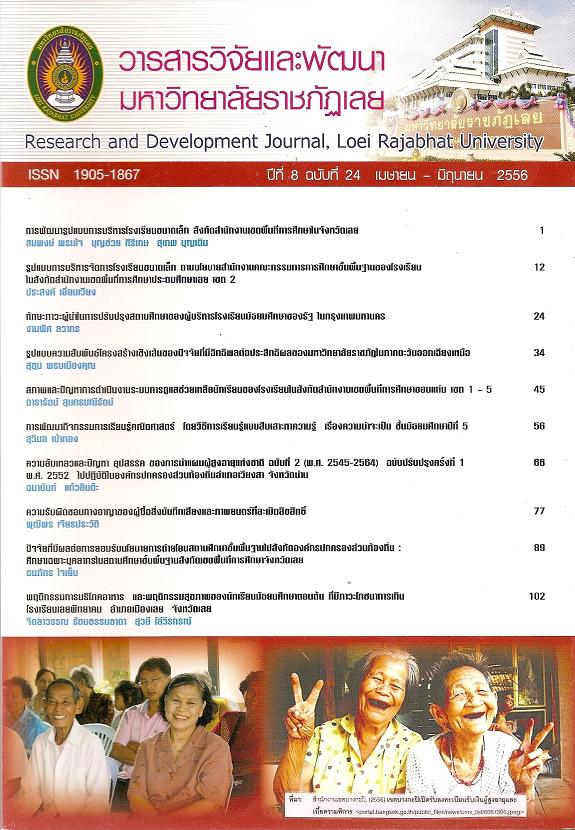การพัฒนารูปแบบการบริหารโรงเรียนขนาดเล็ก สังกัดสำนักงานเขตพื้นที่การศึกษาในจังหวัดเลย
Keywords:
โรงเรียนขนาดเล็ก, รูปแบบการบริหารโรงเรียนขนาดเล็ก, การพัฒนารูปแบบการบริหารโรงเรียน, small sized-schools, a model for the administration of small sized-schools, developing a model for administration of schoolsAbstract
บทคัดย่อ
การวิจัยในครั้งนี้มีวัตถุประสงค์เพื่อ 1) ศึกษาสภาพ ปัญหาและข้อเสนอแนะต่อการบริหารโรงเรียนขนาดเล็ก สังกัดสำนักงานเขตพื้นที่การศึกษาในจังหวัดเลย 2) พัฒนารูปแบบการบริหารโรงเรียนขนาดเล็ก สังกัดสำนักงานเขตพื้นที่การศึกษาในจังหวัดเลย 3) ประเมินผลการใช้รูปแบบการบริหารโรงเรียนขนาดเล็ก สังกัดสำนักงานเขตพื้นที่การศึกษาในจังหวัดเลย มีขั้นตอนการวิจัย 4 ระยะคือ ระยะที่ 1 การศึกษาบริบท ระยะที่ 2 การพัฒนารูปแบบ ระยะที่ 3 การทดลองใช้รูปแบบและระยะที่ 4 การประเมินผลการใช้รูปแบบ กลุ่มเป้าหมายได้แก่ ผู้ให้สัมภาษณ์เชิงลึก จำนวน 15 คน ผู้ร่วมสนทนากลุ่ม จำนวน 30 คน ผู้ร่วมประชุมสัมมนา จำนวน 30 คน โรงเรียนขนาดเล็กเข้าร่วมใช้รูปแบบจำนวน 3โรงเรียน ผู้ตอบแบบสอบถามเพื่อประเมินผลการใช้รูปแบบ จำนวน 49 คน เครื่องมือที่ใช้ในการวิจัยคือ แบบบันทึก แบบสัมภาษณ์ แบบสังเกต แบบสอบถามและแบบประเมิน วิเคราะห์ข้อมูลโดย การวิเคราะห์เนื้อหา ค่าความถี่ ค่าเฉลี่ย และค่าส่วนเบี่ยงเบนมาตรฐาน ผลการวิจัยสรุปได้ดังนี้
1.สภาพปัญหาในการบริหารจัดการของโรงเรียนขนาดเล็ก สังกัดสำนักงานเขตพื้นที่การศึกษาในจังหวัดเลยที่เป็นปัญหามากที่สุดได้แก่ ปัญหาด้านวิชาการ ส่วนข้อเสนอแนะในการแก้ปัญหานั้นพบว่า โรงเรียนขนาดเล็กควรนำภาระงานมาบริหารร่วมกัน
2. รูปแบบการบริหารโรงเรียนขนาดเล็กในสังกัดสำนักงานเขตพื้นที่การศึกษาในจังหวัดเลย ได้แก่รูปแบบศูนย์บริหารการเรียนร่วมโรงเรียนขนาดเล็กที่มีโรงเรียนขนาดเล็กตั้งแต่ 2 โรงเรียนขึ้นไป มาร่วมกันบริหารจัดการใน 3 ภาระงาน คือ 1) งานวิชาการที่เกี่ยวกับหลักสูตร งานการจัดกิจกรรมการเรียนการสอน งานนิเทศกำกับติดตาม งานการวัดและประเมินผล 2) งานบุคคลที่เกี่ยวกับการใช้และพัฒนาบุคลากร 3) งานบริหารทั่วไปที่เกี่ยวกับงานธุรการและสารบรรณ โดยดำเนินการในรูปของคณะกรรมการบริหารศูนย์ที่ได้รับมอบอำนาจบริหารจัดการมาจากสำนักงานเขตพื้นที่การศึกษาต้นสังกัด โดยอาศัยอำนาจตามกฎกระทรวง กำหนดหลักเกณฑ์วิธีการและลักษณะของงานที่จะให้สำนักงานเขตพื้นที่การศึกษาเป็นผู้ปฏิบัติงานเฉพาะอย่างแทนสถานศึกษาที่จัดการศึกษาขั้นพื้นฐานและส่วนราชการที่เรียกชื่ออย่างอื่น พ.ศ.2547 ภายใต้แนวทางการดำเนินงานตามภาระงานของศูนย์ที่กำหนดไว้
3. การประเมินผลการใช้รูปแบบศูนย์บริหารการเรียนร่วมโรงเรียนขนาดเล็กสังกัดสำนักงานเขตพื้นที่การศึกษาในจังหวัดเลย จากแบบสอบถามชุดที่ 1 พบว่า ผลการดำเนินงานโดยภาพรวม อยู่ในระดับมาก โดยด้านการจัดระบบและโครงสร้างการบริหารของศูนย์ มีผลการดำเนินงาน มากที่สุด รองลงมาได้แก่ ด้านภาระงานของศูนย์ และด้านแนวทางการดำเนินงานตามภาระงานของศูนย์ ตามลำดับ ส่วนผลการดำเนินงานตามแนวทางการดำเนินงานตามภาระงานของศูนย์นั้นในภาพรวมอยู่ในระดับมาก โดยงานด้านวิชาการมีผลการดำเนินงานสูงสุด รองลงมาคือ ด้านงานบุคคล และด้านงานบริหารทั่วไปตามลำดับ จากแบบ สอบถามชุดที่ 2 พบว่าผลการดำเนินงานในภาพรวมอยู่ในระดับ มาก โดย ข้อที่ 1 นักเรียนได้เรียนรู้ครบทุกกลุ่มสาระการเรียนรู้ มีผลการดำเนินงานมากที่สุด ( = 4.78) รองลงมาคือข้อที่ 2 ครูใช้วิธีการสอนที่หลากหลายมาใช้ในการจัดกิจกรรมการเรียนการสอน( = 4.67) และข้อที่ 10 นักเรียนมีเพื่อนใหม่เพิ่มขึ้น ( = 4.44 ) ตามลำดับ ส่วนข้อที่ 7 นักเรียนได้แสดงออกเต็มตามศักยภาพของตนเอง( = 3.67) มีผลการดำเนินงานน้อยที่สุด
Abstract
This research was designed : 1) to investigate the state, problem and recommendation for small school management under the Office of Loei Educational Service Areas, 2) to develop the management model for the schools, and 3) to evaluate the results of the small schools management model. The research procedures consisted of four phases : phase 1 was the study of current context. Phase 2 was to develop the model, phase 3 was the model trial then evaluated the results of model usage was operated in phase 4. The target comprised 15 informants for in-depth interview, 30 participants for the focus group discussion, 30 seminar participants, 3 small-sized schools volunteering to pilot the management model and 49 questionnaire respondents to evaluate the model implementing. The research tools for data collection were the forms of field note, interview, observation, a questionnaire and the evaluation. The collected data were analyzed by content analysis, frequency, mean and standard deviation. The research findings revealed as follows :
1. The main problem of small sized school administration was the academic administration and small sized schools should be cooperative in workload administration.
2. The school management model was found that the appropriate model was a small sized school collaborative administration center. This administrative center was established for two small sized schools or more to co-work on the management for three workloads : 2.1) academic workload concerning syllabus, instructional activities, supervision and following up and assessment and evaluation. 2.2) personal workloads concerning personnel allocation and development, and 2.3) general affair workloads concerning correspondence and secretariat work. The center was run by the executive committee who were officially appointed by the authorization of the Educational Service Area Office. According to the virtue of the B.E. 2547 Ministerial Act, the rules, procedures and certain job scopes and description should be determined thus the authorized Educational Service Area Office would be responsible for representing the basic educational institutions or other government agencies called by other names.
3. The assessment results of the model implementing of a small sized school collaborative administration center based on the first set of questionnaires showed that the overall aspect of the implementing was at the high level. The Center’s organizing and structuring management was ranked at the highest level followed by workloads and guidelines of the workloads respectively. The results of the implementing according to the center’s workload was found at a high level. ( = 4.78) Considering each aspect, the academic workload was the highest results ( = 4.67) and followed by personal ( = 4.44 ) and general affair workloads respectively. ( = 3.67)
Based on the second set of questionnaires, the total aspect of the implementing results was at a high level. The item #1 the students learned covering all matters of strands and the results of implementing was ranked at the highest level. It was followed by the item # 2, teachers applied various teaching methods in the instructional activity approach and the item # 10 the students have new friends respectively. The lowest level found was the item # 7, students presented their ability potentially.
Downloads
Issue
Section
License
ข้อความที่ปรากฎในวารสารฉบับนี้เป็นความคิดเห็นของผู้เขียนแต่ละท่าน สถาบันวิจัยและพัฒนา มหาวิทยาลัยราชภัฏเลย และกองบรรณาธิการ ไม่จำเป็นต้องเห็นด้วยและไม่มีส่วนรับผิดชอบใดๆ
สถาบันวิจัยและพัฒนา มหาวิทยาลัยราชภัฏเลย ขอให้ผู้อ่านอ้างอิงในกรณีที่ท่านคัดลอกเนื้อหาบทความในวารสารฉบับนี้






